- Home
- J. P. Donleavy
Meet My Maker the Mad Molecule
Meet My Maker the Mad Molecule Read online
MEET MY MAKER THE MAD MOLECULE
“Donleavy’s talents at their best … a pleasure.”
—Book Week
“… no contemporary writer is better than J. P. Donleavy at his best.”
—The New Yorker
THE SADDEST SUMMER OF SAMUEL S
“Glorious … a milestone in Donleavy’s writing career.”
—San Francisco Examiner
“A haunting story … touching and outrageous.”
—Boston Globe
J. P. DONLEAVY
MEET MY MAKER THE MAD MOLECULE
Contents
SHORT STORIES AND SKETCHES
Title Page
The Romantic Life of Alphonse A
The Mad Molecule
At Longitude and Latitude
Call Me Cheetah
A Fairy Tale of New York
One for Yes
A Friend
Dear Sylvia
Dear Hugo
Party on Saturday Afternoon
Whither Wigwams
Rackets and Riches at Wimbledon
When I Bought a Bear
Paddling and Persons at Putney
In My Peach Shoes
When I Brought the News
Franz F
A Fraternal Fraud
Pins and Medals
It Was My Chimes
A Grave
Thamn
My Painful Jaw
I Failed
You Murdered My Cat
Meet My Maker
Gustav G
About the Author
By the Same Author
Copyright
The Romantic Life of Alphonse A
He had an athletic build and walked legs slightly parted like a cowboy. His white haired father had been a pillar of the community, sometimes carrying a small automatic for which he had a license. Alphonse was his one problem child in four. And Alphonse went through life saying often, I want to settle down, you know, have a work out once in a while, keep in good condition, get plenty of sleep, maybe spend a few months in Vermont hunting.
Alphonse had a beautiful way of putting out his hand to say hello. And it went whispered he’s nice, isn’t he. But long before Alphonse’s father died, he said to his son, your life is immoral. Alphonse standing on the carpet of his father’s study, his charm hand out, saying, just prove one thing dad, that’s all I’m asking, one thing where you know without a doubt I’ve been immoral.
And Alphonse’s father, turning a pencil in thin fingers behind his desk, said “What about all the speeding fines I’ve had to pay for you, it was lucky they didn’t get you on a drunk charge, what were you doing with perfume all over you.” Alphonse in spring seersucker, scuffing one buckskin shoe with the sole of the other, “Look Dad, they would have got me on a drunk charge but I put Lila’s perfume over me so they couldn’t smell it.”
“You flaunt the law.”
“Dad everyone flaunts the law.”
“That’s no excuse for a son of mine.”
These meetings mostly monthly had happened right through college. In the same book lined professional room and concluded as Alphonse turned to the door with his father’s last words, “I’ve got a reputation to uphold in this community.”
On the Autumn days in the stadium exploding with red blue gold, booming bands and yelling young men and women, Alphonse’s father, in racoon on the fifty yard line, elbowing his neighbour in the ribs as Alphonse dazzled his way down the field, shouting in the roar, “That’s my boy.” And later in the locker room, Alphonse silent with his sheepish sadness, listened as his Dad said “I didn’t like the way you sized up a few of those plays, you were lucky to win.”
Alphonse with large hands which he laid on his knees, spreading peaceful lonely fingers. And when the four Autumns were over he left behind a string of golden touchdowns with a record of straight A’s and on distant tree shaded campuses, three girls heartbroken. In company he greeted new faces easily, asking after their first names and their hobbies like a beer salesman. He brought girls home on weekends who said they loved his family and the way they lived. Mirabelle the maid of twenty years dedicated service presented meals and Sunday jokes and snored at nights across the hall from the guest room. Where Alphonse, when the girl was in the warmth and friendliness of his family, went to visit past midnight to whisper urgently, “Honey, what would my family think of me if you started screaming.”
The girls changed with the weather. His father said, “When are you going to settle down and get some responsibility. You use this house like a train station. Find yourself a nice girl. This house is not an hotel.” At these times Alphonse would drive down a dingy Cambridge street to Scollay Square and have a few crazy beers, tipping the bartender and buying the house until everyone present thoroughly loved him. They all said, “You’re a good Joe.” Alphonse said, “Call me Al.”
Decisions in Alphonse’s life were dreams to live after the war. In buckskin shoes, broadcloth shirts, and tasteless ties affected for freedom. He loved the Army, where, as he sat over sheets and sheets, sometimes holding his belly in agonies of repressed laughter, chaos, ineptitude, memorandi and a few orders of the day, sneakily issued by himself, mounted more chaos, ineptitude and memorandi. With lofty dignity he picked the egg shell and debris out of the morning scrambled egg, frequently retaining one of the hard-boiled variety for evening peckishness. Outranked by the entire Army he exercised his love of duty and discipline constantly. Standing before this new, nearly almighty father, in regulation uniform resplendent in spit and polish, saluting snappily upon all and any occasion especially those least particular.
When the last shot was fired, Alphonse, one finger caught in the handle of a cup of tea, sat back in his chair at his desk as his fellow Army clerks rushed out under the Virginia sky to yell. Alphonse for his own little celebration went to the wall and carefully weighted the fire axe in his hands as he had done with so many college baseball bats. Trucks roared by, guns boomed, sirens rang, it seemed such a late milky afternoon. And that night being led to the stockade, Alphonse worried about his physical condition, it having taken six axe blows to divide the master sergeant’s desk in half. Later taking six phone calls to Washington for his father to effect an honorable discharge.
And as some friends lapsed into marriage, and he settled down to perhaps a siege of bachelorhood, he took beer and chicken, bologna and pizza in the newly wed kitchens as they told him over and over that he should do it. And taking the occasion as a privilege for a rhyme, Alphonse leaned deeply over the porcelain and said, “Do you rue it.” Sometimes voices were raised and it was said, “You’re not the same Alphonse A we used to know.”
On a middle September day following that summer, bronzed to a berry, skittish and full of not what you’re thinking, Alphonse A stood at attention on the stern of the good ship Franconia in ten fathoms and saluted the flag flying over Fort Jay, murmuring hello in his heart to those in clerkship at the U.S. Military Headquarters of the First Army. That lofty skyline of that terrible temptation to go up and be up and stay up, slowly faded to tiny tips above the water and was gone as the gong went for dinner. At Cobh he took a train to Dublin to a lush stout filled year at Trinity College where he happily read the higher philosophies and lived with a family who took him as one of their own. Washing dishes, gathering praties from their tiny back garden, chopping carrots and cabbage in the red brick scullery.
Diedre who sat next to him at logic lectures asked him to picnics on the beach at Killiney and Alphonse came to whisper in her ear that he loved her like a sister. Night times sometimes down on the shadowy Dublin quays, Alphonse found querulous women, hard but hearty, who spent his money b
ut later liked him for himself. And as this last happy year in his life slowly died and left memories of the green grass of the playing fields where in his Harvard sweat suit he pranced and played a mock football with the rugby team and learned to wield a cricket bat with the best, he packed, waved and wept.
Coming back to America on a cargo ship as a cook, broke and humble. Ladling slops over the side to seagulls. Spying a black fish’s haunted fins and sleeping desperate and tired at night in his sack. Diedre he left with a promise of passage to the new world and she said last thing of all, “Don’t lie to me. It makes it worse than never seeing you again.” And he said, “I don’t think I’ll ever see you again.” And she laid a lash of hand across his jaw for not lying. Alphonse inaudible as he said it is logical to lie. Turning it into a personal poem on the ship.
It is logical
To lie
To women
And they like it.
Diedre was dark haired and blue eyed. And the memory of her lay lightly on all the water between New York and Europe. As his ship put into the greyness and a sweet sour misty air. It was raining quietly on Fort Jay and the skinny fuzz of Staten Island. He was a dreg. Albeit with a fancy education. Passenger liners plowed by, out to sea, perhaps sorrow and some hundred miles away in the evening they would have a get together dance. And looking at this shore, give me your poor and something, your starving, and perhaps something else. And in the haze, my goodness, a shore, the rubber, the gasoline, not to mention the steel and various alloys. But this was no way to look at the United States and shortly following his taxi ride to a central position, Alphonse wired his father.
AT BILTMORE NO MONEY NEED MORE
It was likely that only a few charges of immorality in the study and some remarks, what do you think I am to have done for you what I’ve done and you turn out to be a bum. Stopping in that tree shaded Boston street, up the steps of this red brick house where he was born and listened to afternoon baseball games. Mothers go through the house and clean up the childhood dust which dances in the sunlight. Mothers just want to hold you. And father is waiting in the study. Alphonse putting one foot in front of the other, looking at the floor and listening.
“What do you think I am.”
“Look Dad.”
“To have reached where I am and have you grow up to be a bum.”
“Dad.”
“A bum. A suite of rooms. Who the hell do you think you are, and throwing a party on my money. My money, let me make that clear. I didn’t ask you to be my son. You’ve been an unwanted liability in my life. Now you’re going to tell me you were Phi Beta Kappa and captain of the football team.”
“I’m not saying anything, Dad.”
“And you’re intending to live on it for the rest of your life. Ethics. That’s what you need.”
“Dad, look, you must’ve in your spare time swapped your ideals to make a fast buck.”
“How dare you.”
“Dad, it’s life.”
“How dare you indeed.”
Between these faint green walls, moroccan bound books everywhere. Rectitude and fortitude, vice and virtue, eyes in the windows all over the neighbourhood. A cinnamon smell of apples cooking.
“Even you Dad, have said times come when some grim decisions have to be made. And maybe someone gets wiped out overnight.”
“How dare you.”
“I’m telling you Dad, surely it’s this way.”
“Get out.”
“Dad I know you’ve swapped your ideals to make a fast buck. But do I hold it against you.”
“Get out of this room and don’t come back till you’ve got manners to speak to your father.”
Alphonse, avoiding rigid go getting collegiates, took a superficially vulgar residence in a basement in Brooklyn. There were nearly two windows on the street peeking up over a rather rancid little garden. Some yards away out of a patch of earth in the pavement grew a cotton ball tree. His two fellow occupants said, “We believe in live and let live.” Respectively they had come to New York from Iowa and Maine, meeting at the children’s sand pit one summer evening at Eighty Third Street and Central Park West. And together in their close friendship they bought two Dalmatian dogs who lived tied in the bathroom in a most unsanitary manner indeed. But for the low rent and the live and let live, Alphonse was terribly tempted to say, “For Christ’s sake.”
But said little at all. Leaving the front of the house in his yellow Ford to drive north through Brooklyn avoiding Brownsville while murmuring a prayer for the Moors on Livonia Avenue. Amid moaning vehicles, one low voltage brain guiding so many horsepower over the East River and past the grey reminder of Bellevue to ease down a concrete ramp, rolling firmly to a stop on this narrow island of opportunity. Which was a tall brick building with an institutional entrance and a wide floor of desks seven stories up. Where he said, “Hi Gage, how you doing, Tony what’s with you, Frank, all O.K.” And sat, spinning round once in this green office chair. And this Gage stopped once hovering and said into a curious middle distance between them, “I can’t understand it, a guy with your qualifications and background, selling beer.” And the answer taking poetic shape in his head.
I know
It may sound queer
I fear
That I sell
Beer.
Slipping quietly away to his canvassing area. Back through reddish Brooklyn streets. The loneliness of noon in some dark tavern where Alphonse A would announce in the barroom shade, “Gentlemen, I would like to buy you all a drink of a brew which speaks for itself.” It was accidental that Alphonse found this beer absolutely marvelous and believed all the good things he said about it, and therefore mostly said, “Drink up.” Quietly throughout the next two hours sending perhaps seven men home stoned to their unappreciative wives. And slightly squiffed himself, retired to his club to steam out the wheaty distillate, lying amid towels, hearing the depressing murmur of big deals discussed through the steam. And he reflected with genuine sorrow that he was at the very bottom of the ladder if it had any rungs at all.
Fragmentary women came into his life. And one who was a school teacher in Brooklyn. This Rebecca wore frilly lace on shirt fronts to hide a handy bosom and black severe skirts discreetly across her neat behind. She scuffed her way through the Botanic Garden leaves in flat laced up brown shoes, Alphonse parking his saffron Ford on Flatbush Avenue, saying, there’s a plane tree growing in Prospect Park. And I like your knowledge and I like your hair and I like the way you’ve passed through your marriageable days so beautifully unmarried. And how you look with books and how nearly all the men pass your beauty by. And leave your magic all to me.
She was entranced. Almost. And that Sunday evening of Rebecca’s first weekend in the warmth of his folks’ Alphonse was present at attention for the talk with father in the study. As Dad narrowed his eyes, tilted his head, and tapped ash from a cheroot, “She’s the smartest thing you’ve ever done. Do you deserve her. I wonder. They’ve all been trollops in the past stacked up against her. That’s all I’ve got to say, except get out of this beer racket and get a position.”
“I’m glad you said that Dad. I’ve been thinking that.”
“Don’t soft soap me.”
“I’m not, I genuinely feel I ought to have a position deserving of Rebecca.”
“Get one.”
“You said it, Dad.”
Sunday like all the other Sundays, a drive out around Cambridge, down Brattle Street, by the desolation of Fresh Pond, Clay Pit Pond, Spy Pond and desperately on to the Mystic Lakes until she said, “Can’t we go somewhere nice. Instead of all these ponds.” Rebecca was reared by aunts in Staten Island, with her own little seat for years on the ferry. With books gathered up to her chest as she steamed back and forth to the tip of that tall urbs, and sat with her temperate face and copper hair which said to all who looked, I’m serious minded and no pushover.
And weekend followed weekend to Boston, that good old bean town. And they told
friends, yes, yes, we’re thinking of settling down, yes, white picket fence, yes, I’m in beer, yes, Rebecca will go on teaching, yes, it’s all about time. And about this time, Alphonse A when no one was looking, was looking sad stepping down those cruel steps in Brooklyn through dog musty air to throw himself on his bed in his dissipated room, and say up at the remnants of a Victorian ceiling, “For Christ’s sake they’re all murdering me.”
With news of nuptials whispered from uncle to aunt and other eye brow raisers, the shackles and chains closed around Alphonse A. He thought of ships and islands, the deep green spring of Dublin where dying is no defeat. And where one must suppose in all honesty, living was no victory. And now driving to friends’ houses, pleading over the porcelain, tell me before it’s too late, what’s it really like, I’m too young to love under contract.
Kisses on her neck as they parked under trees, seeking shelter for his sad hands under her clothes. And she said, “I will when we wed.” And Alphonse said, “But we’re grown human beings, besides I’m an athlete needy of a normal love relationship.” Rebecca said, “Tell it to the Marines.” In the silence that followed and in the longer lonelier and later ones, Alphonse’s hands wanted to go around her throat. Instead, he drove too fast and it always happened, down some pyjamaed judge’s basement, three in the morning, pay thirty dollars, and “Don’t do it again son, shame on you.”
Till that weekend. How she smiled up proudly as voices knew him in the stands as Harvard was soundly trounced by Yale. She climbed up on the crook of his arm cheering hopefully and Alphonse said not a hope. But in the afternoon golden sun it was a large day of old friendships. Sailing into handshakes on a slight collision course. And later they drank beer, sang, and had dinner on a roof just as Fall was chilling the windows closed and the tide was turning in the trees.

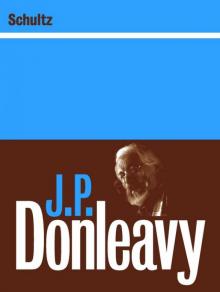 Schultz
Schultz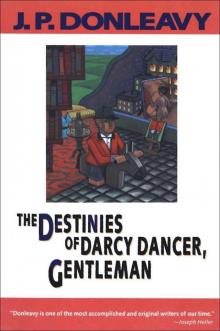 The Destinies of Darcy Dancer, Gentleman
The Destinies of Darcy Dancer, Gentleman The Lady Who Liked Clean Restrooms
The Lady Who Liked Clean Restrooms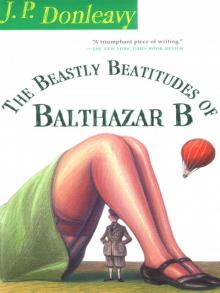 The Beastly Beatitudes of Balthazar B
The Beastly Beatitudes of Balthazar B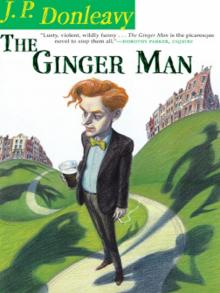 The Ginger Man
The Ginger Man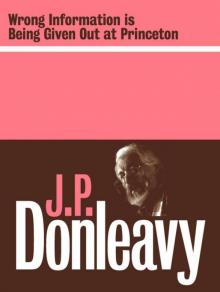 Wrong Information Is Being Given Out at Princeton
Wrong Information Is Being Given Out at Princeton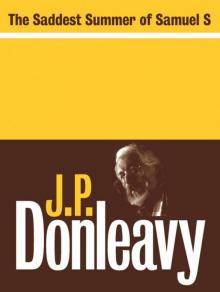 The Saddest Summer of Samuel S
The Saddest Summer of Samuel S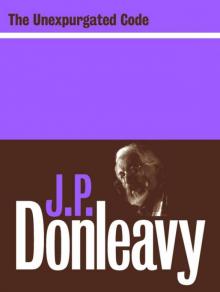 The Unexpurgated Code
The Unexpurgated Code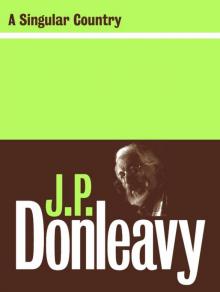 A Singular Country
A Singular Country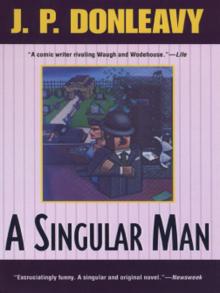 A Singular Man
A Singular Man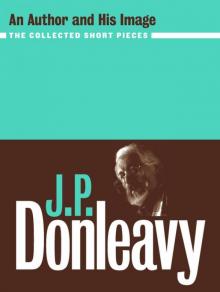 J.P. Donleavy: An Author and His Image
J.P. Donleavy: An Author and His Image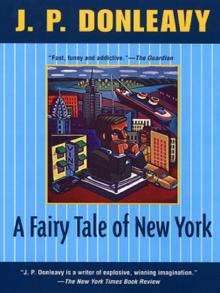 A Fairy Tale of New York
A Fairy Tale of New York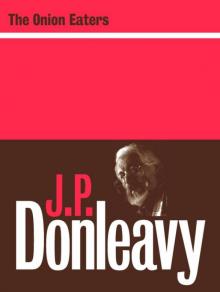 The Onion Eaters
The Onion Eaters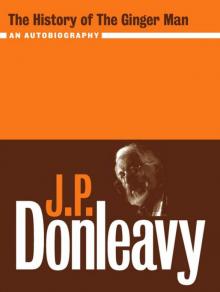 The History of the Ginger Man: An Autobiography
The History of the Ginger Man: An Autobiography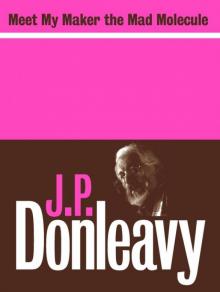 Meet My Maker the Mad Molecule
Meet My Maker the Mad Molecule Leila
Leila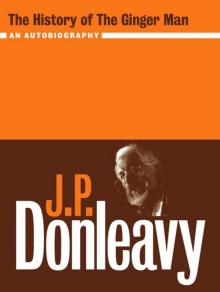 The History of the Ginger Man
The History of the Ginger Man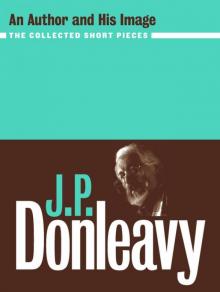 J.P. Donleavy
J.P. Donleavy